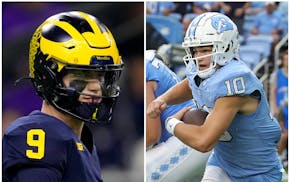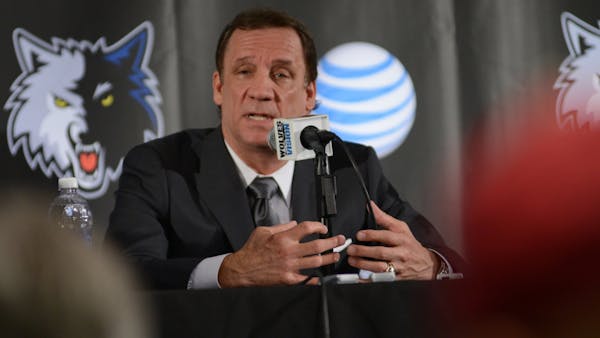As a billionaire businessman, Glen Taylor has bought his share of companies over the years. He's also had proposed deals fall apart before they reached pen-to-paper finality as sellers expressed a change of heart.
"It got down to the last day and they walked out and said, 'I can't sell my company,' " Taylor said.
That's essentially what Taylor decided with his basketball franchise, minus any 11th-hour dramatics. On May 4 last year, Taylor disclosed that he wanted to sell the Timberwolves in a transitional process. On Friday, Taylor announced he's turning the "opposite direction" and taking his team off the market with the hope of purchasing a larger interest in the operation.
What happened?
"I had seller's remorse," he said.
Taylor revealed his about-face during Flip Saunders' introductory news conference as team president of basketball operations and minority owner. The two men sat together on a podium inside Target Center, the former coach returning home and the 72-year-old owner invigorated by the prospect of maintaining majority control of a team he's owned since 1995.
Not only is Taylor not selling the team, he also has offered to buy out his 12 minority owners. Taylor said he expects half will take the buyout. Though he declined to provide too many specifics, Taylor said it would cost "less than $100 million" to buy out all of his limited partners. At the same time, he indicated that he'd like to find new limited partners with Minnesota ties.
As for what steps he can take to ensure the Wolves remain in Minnesota after he's gone, Taylor offered a sly response.
"I think you'll see the answer to that in a couple of weeks," he said.
Taylor's ledger as owner includes a mixed bag of good, bad and downright bizarre. He has displayed a willingness to spend money aggressively, but he also can be tightfisted at times. He's incredibly loyal to employees — sometimes to a fault — which creates a perception that top decisionmakers escape accountability in difficult times.
By no means is Taylor a perfect owner. He's made mistakes that have impacted his organization severely, and his long-leash approach has fostered an atmosphere of complacency. Long-suffering Wolves fans might cringe over Taylor's reluctance to sell, and that reaction is understandable.
However, Taylor made a good decision in bringing Saunders back in an executive role to work side-by-side with a Hall of Fame coach in Rick Adelman. Those two men know what they're doing. And Taylor sounds genuinely committed to building a winner after years of heartache, missteps and rumors that he's lost obscene amounts of money, some speculating as much as $25 million in one season.
"All of a sudden I realized, 'Geez, what if I do sell this team?' " he said. "I like coming here watching the games. I like being involved in this."
The final straw came about a month ago during a meeting with Saunders about an ownership sell. As Taylor talked about his team and his optimism for the future, Saunders asked why he's selling the team.
"He said to me, 'Are you really interested in selling the team? You don't act like it,' " Taylor said. "I said, 'No, I'm not.' "
A confluence of factors led him to that point. Taylor began the exploratory process of selling the team last spring, knowing he's not getting any younger and that he needs an eventual exit strategy or plan in the event he died unexpectedly. He did the same thing with all his companies.
Taylor made two things clear from the outset: He wanted to phase out gradually as majority owner, and he would not sell to anyone who intended to move the Wolves out of Minnesota.
A handful of prospective groups approached him, none with Minnesota roots. Some wanted to move the team or take control immediately. A few offered to keep the team here but made lowball offers.
At the same time, Taylor sees opportunities to grow the value of his franchise, including a new collective bargaining agreement that's small-market friendly and an upcoming TV contract for the NBA. Taylor also said he's "very positive" that a $100 million renovation to Target Center will begin eventually.
"Let's just say, being a good businessman, I think someday it will be figured out [that] when Glen Taylor didn't sell his team in 2013 and he kept it until 2023, that he made a lot of money," Taylor noted. "Most of that money is going to go to good causes. It's not going to Glen Taylor or his family. It's going to good causes in Minnesota."
Chip Scoggins • ascoggins@startribune.com

Scoggins: Finch feeling heat of the Suns as playoff battle looms
Scoggins: Why 'championship or bust' fits these Wolves

Scoggins: Anatomy of a game-saving play as Correa throws out Ohtani


